Understanding the Landscape of Veteran Mental Health in Long-Term Care
As the veteran population continues to age, the need for specialized mental health services in long-term care settings becomes increasingly vital. Ensuring Veterans receive comprehensive, accessible, and effective mental health support is pivotal to improving their quality of life, reducing health disparities, and addressing prevalent mental health issues such as PTSD, depression, and traumatic brain injury. This article explores the various programs, strategies, and policies in place aimed at supporting Veterans’ mental well-being in long-term care environments.
Range of Mental Health Services for Long-Term Care Veterans
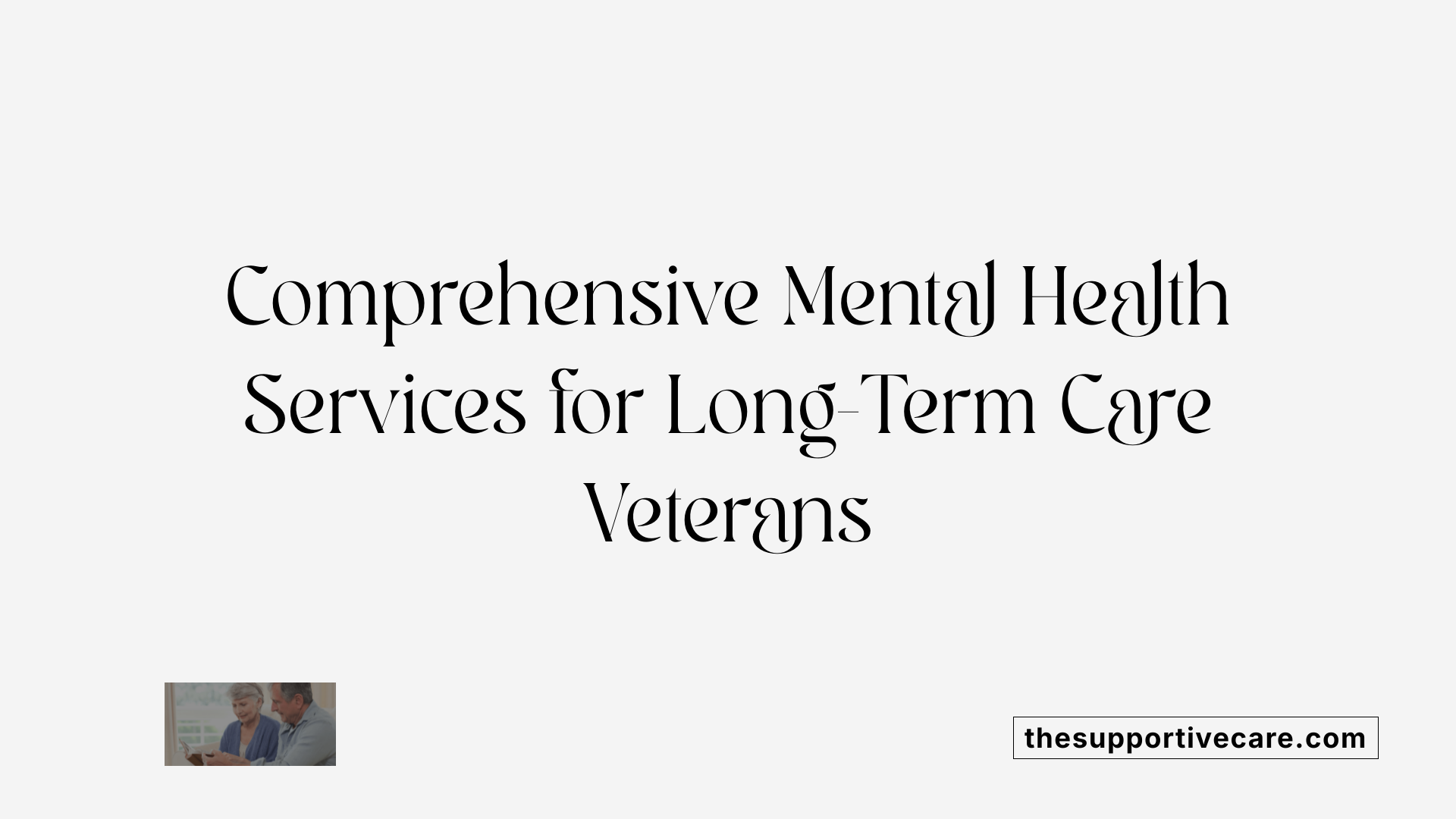
What mental health services are available for veterans in long-term care?
Veterans receiving long-term care through the VA have access to an extensive and diverse set of mental health services designed to meet their unique needs. These services include both outpatient and inpatient mental health treatments, counseling, medication management, and crisis intervention.
Outpatient services are easily accessible and flexible, allowing veterans to receive therapy, support groups, and medication reviews either at VA clinics or via telehealth platforms. Inpatient programs are available for veterans with severe or complex mental health conditions, such as intense depression, psychosis, or acute episodes of PTSD.
Crisis support is a vital component of VA mental health care. The Veterans Crisis Line operates 24/7 to provide immediate counseling and connect veterans in crisis with emergency services. This ensures that veterans facing urgent mental health challenges receive timely assistance, no matter where they are.
The VA also offers community-based mental health services through Vet Centers, which deliver readjustment counseling, family support, and community reintegration programs. Peer support groups are integrated into many programs, fostering a sense of community and shared understanding among veterans.
Specialized programs are tailored to address specific conditions common in long-term care populations. These include focused interventions for post-traumatic stress disorder (PTSD), military sexual trauma (MST), and traumatic brain injury (TBI). Such programs utilize evidence-based treatments like Cognitive Behavioral Therapy (CBT), Eye Movement Desensitization and Reprocessing (EMDR), and other innovative approaches.
Medication management is integrated into most mental health services to help control symptoms associated with various mood and anxiety disorders, substance use issues, and other psychiatric conditions. Zoos and clinics staffed by experienced mental health professionals ensure individualized treatment plans.
Access is broad and inclusive: veterans can receive services regardless of discharge status, service history, or VA health care enrollment. Many services can be accessed the same day they seek help, whether through face-to-face appointments, telehealth consultations, or contact via the helpline.
Overall, the VA’s mental health offerings for long-term care veterans aim to provide comprehensive, accessible, and effective support, promoting recovery, stability, and improved quality of life.
| Service Type | Settings | Focus Area | Availability Details |
|---|---|---|---|
| Outpatient Therapy | VA clinics, telehealth | PTSD, depression, anxiety, substance use | Flexible scheduling, same-day access, nationwide reach |
| Inpatient Care | VA medical centers | Severe mental illness | Intensive, structured programs |
| Crisis Support | Veterans Crisis Line | Immediate emergency | 24/7 rapid response |
| Peer Support | Vet Centers, community programs | Reintegration, mental health stigma | Community-based, ongoing support |
| Specialized Programs | PTSD, MST, TBI clinics | Specific conditions | Evidence-based treatments, tailored interventions |
| Medication Management | VA clinics | Mood, psychosis, anxiety | Personalized plans, monitored by specialists |
Understanding and navigating VA mental health services can significantly improve a veteran’s long-term well-being. Ensuring seamless access across multiple channels helps veterans receive consistent support tailored to their evolving needs, ultimately fostering resilience and recovery.
Support Programs and Resources for Veteran Mental Health
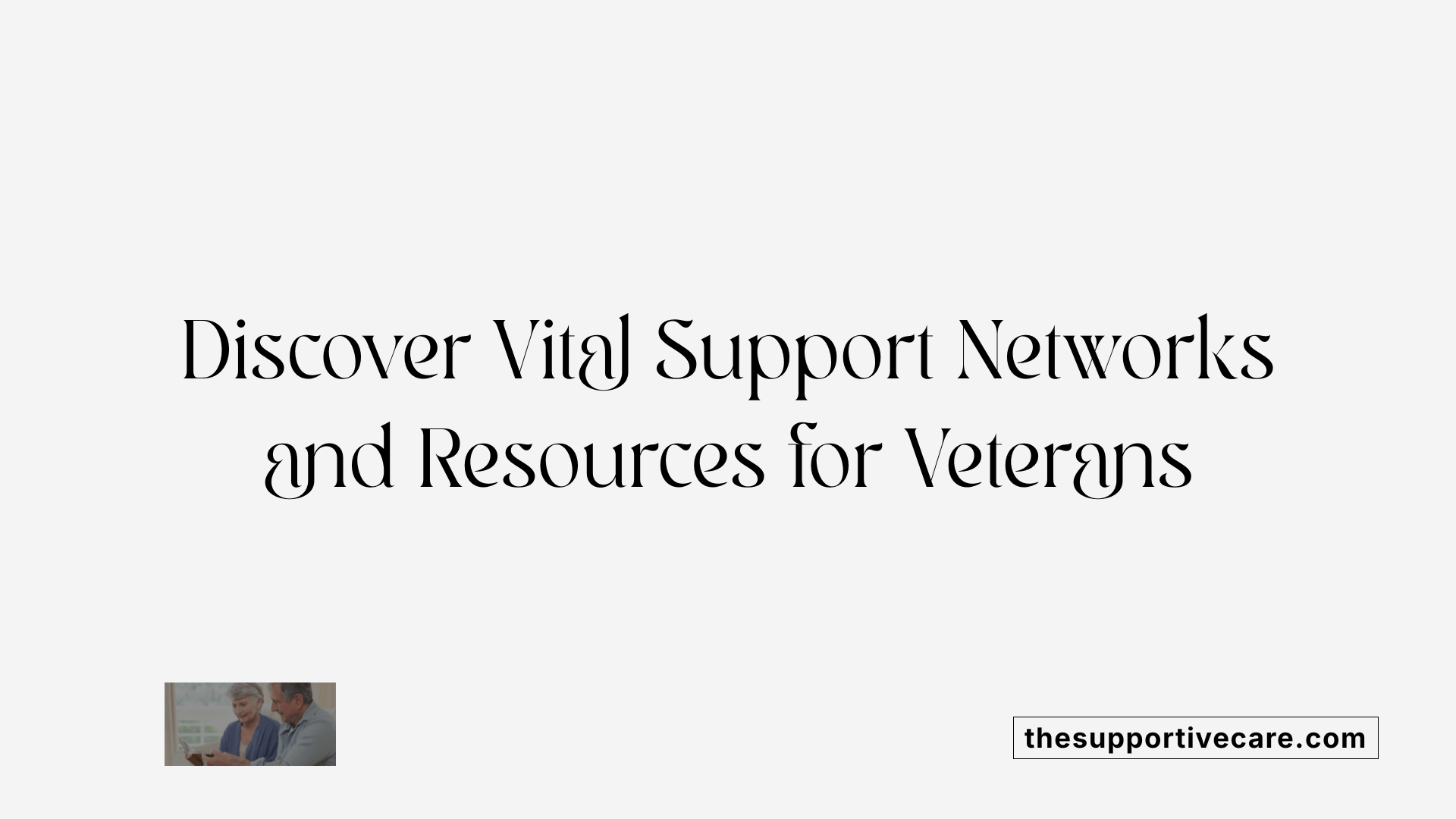
What support programs and resources are available for veterans' mental health through organizations like the VA and others?
Veterans seeking mental health support have access to an extensive array of programs through the Department of Veterans Affairs (VA) and various non-profit organizations. The VA provides comprehensive mental health services, including inpatient and outpatient care, telemental health programs, crisis support, and counseling for conditions such as PTSD, depression, anxiety, bipolar disorder, schizophrenia, and substance use issues. These services are accessible regardless of discharge status, service history, or eligibility for VA health care, with many available without prior enrollment.
A cornerstone of VA mental health support is the Veterans Crisis Line, operating 24/7 to assist veterans in immediate distress. Vet Centers offer community-based counseling and peer support, fostering trust and comfort for veterans and their families. Additionally, specialized centers like the National Center for PTSD and the VA's Psychosocial Rehabilitation and Recovery Centers focus on research, treatment, and recovery support for severe mental health conditions.
Beyond VA services, veteran-supporting organizations such as the Wounded Warrior Project, Iraq and Afghanistan Veterans of America (IAVA), and Cohen Veteran Network provide free workshops, professional mental health services, and personalized care options. Since 2010, the Wounded Warrior Project alone has served thousands of veterans and families, offering programs tailored for PTSD, military sexual trauma, traumatic brain injury, and other post-deployment issues. Their services can be accessed via phone, email, chat, or in person, removing many barriers to care.
Community initiatives also play a pivotal role. Campaigns like "Make the Connection" and the President’s PREVENTS (President’s Roadmap to Empower Veterans and Endorsements for Suicide prevention) focus on connecting veterans with mental health resources and raising awareness about suicide prevention and recovery pathways.
To further support veterans' mental health, various organizations partner with VA and local communities to deliver targeted outreach, education, and treatment. These partnerships improve the reach, effectiveness, and acceptance of mental health services for veterans, especially in rural and underserved areas.
Overall, veterans benefit from a robust network of programs designed to promote mental wellness, bridge gaps in care, and support recovery from mental health conditions. Access is continually enhanced through innovative platforms, community engagement, and dedicated support resources, with the overarching goal of ensuring no veteran faces mental health challenges alone.
| Organization | Services Offered | Accessibility Features | Additional Notes |
|---|---|---|---|
| VA (VHA) | Outpatient, inpatient, crisis support, telehealth | All eligible veterans, no enrollment required for many services | Focus on severe mental illnesses, trauma, and general mental health |
| Vet Centers | Counseling, peer support | Available nationwide, regardless of VA enrollment | Community-based, fostering engagement |
| Wounded Warrior Project | Workshops, counseling, recovery programs | Free, accessible via multiple channels | Special focus on PTSD and TBI |
| IAVA | Advocacy, mental health workshops | Outreach through events and digital platforms | Community and online support |
| Cohen Veteran Network | In-person clinics, therapy | Free services for veterans and families | Focus on mental health and trauma |
| Community Campaigns | Awareness, prevention programs | Public outreach, online resources | Promotes understanding and stigma reduction |
Veterans and their families have many avenues for support, including government programs, nonprofit services, and community campaigns, all aimed at promoting mental health, resilience, and recovery.
Access, Eligibility, and Utilization of Mental Health Services
How can veterans access and utilize mental health services, and what are the eligibility criteria?
Veterans seeking mental health care have multiple options to access services provided by the Department of Veterans Affairs (VA). They can visit VA medical centers, Vet Centers, outpatient clinics, and use telemental health programs that offer remote counseling and therapy sessions. Additionally, many community-based providers, including private practitioners, work with the VA to expand access, especially in underserved areas.
Support is available regardless of whether veterans are enrolled in VA health care. Even those not currently enrolled can reach out for urgent needs or ongoing treatment. To begin accessing services, veterans can contact their local VA facility directly, complete enrollment forms at VA centers or online, or utilize the VA’s 24/7 crisis support lines in case of emergencies.
Eligibility for mental health services primarily depends on military service. Generally, active-duty and honorably discharged veterans are eligible, provided they did not receive a dishonorable discharge. Service-connected disabilities, including mental health conditions related to military service, can prioritize access. Veterans who served in combat zones or experienced exposure to toxins, hazards, or participating in specific operations like OEF/OIF/OND are often eligible for comprehensive VA benefits, including mental health care.
Veterans do not need to be enrolled in VA health care to receive many mental health services, which helps reduce barriers to care and encourages timely treatment.
Rapid and flexible access points
The VA emphasizes immediate and flexible support options. Veterans can receive help on the same day they reach out. These services include face-to-face appointments at VA clinics, telehealth sessions, phone support, and scheduled follow-ups. For urgent crises, the VA operates a 24/7 Veterans Crisis Line, providing immediate assistance and connecting veterans to local emergency resources if needed.
Ongoing mental health support encompasses a wide range of services tailored to individual needs. This includes individual and group therapy, medication management, crisis intervention, peer support programs, and specialized treatments for conditions like PTSD, military sexual trauma (MST), and substance use disorders.
Ongoing support channels
Beyond initial access, veterans can benefit from continuous care through multiple ongoing support channels. These include outpatient therapy, inpatient programs for severe conditions, residential treatment facilities, and community outreach. The VA also offers programs that support family members and caregivers, recognizing the significant role they play in veteran recovery.
To facilitate ongoing care, the VA encourages veterans to use telehealth services, which have expanded significantly, enabling veterans—especially those in rural or remote areas—to receive mental health support without traveling long distances. The VA’s mental health programs are designed to be accessible, adaptable, and responsive to the evolving needs of veterans.
| Access Point | Description | Eligibility/Details |
|---|---|---|
| VA Medical Centers | In-person mental health assessments, therapy, and inpatient care | Eligibility based on service; no enrollment needed for some services |
| Vet Centers | Community-based centers providing counseling and peer support | Eligibility includes all veterans; no enrollment required |
| Outpatient Clinics | Short-term and ongoing outpatient mental health care | Based on VA eligibility; many services available without prior enrollment |
| Telemental Health | Remote video or phone therapy sessions | Widely available; supports rural and disabled veterans |
| Crisis Support Lines | 24/7 immediate crisis intervention | For emergency mental health needs |
| Community Providers | Private practitioners contracted with VA or independently | Eligibility depends on VA approval and local agreements |
Tailored Mental Health Care Strategies in Long-Term Settings
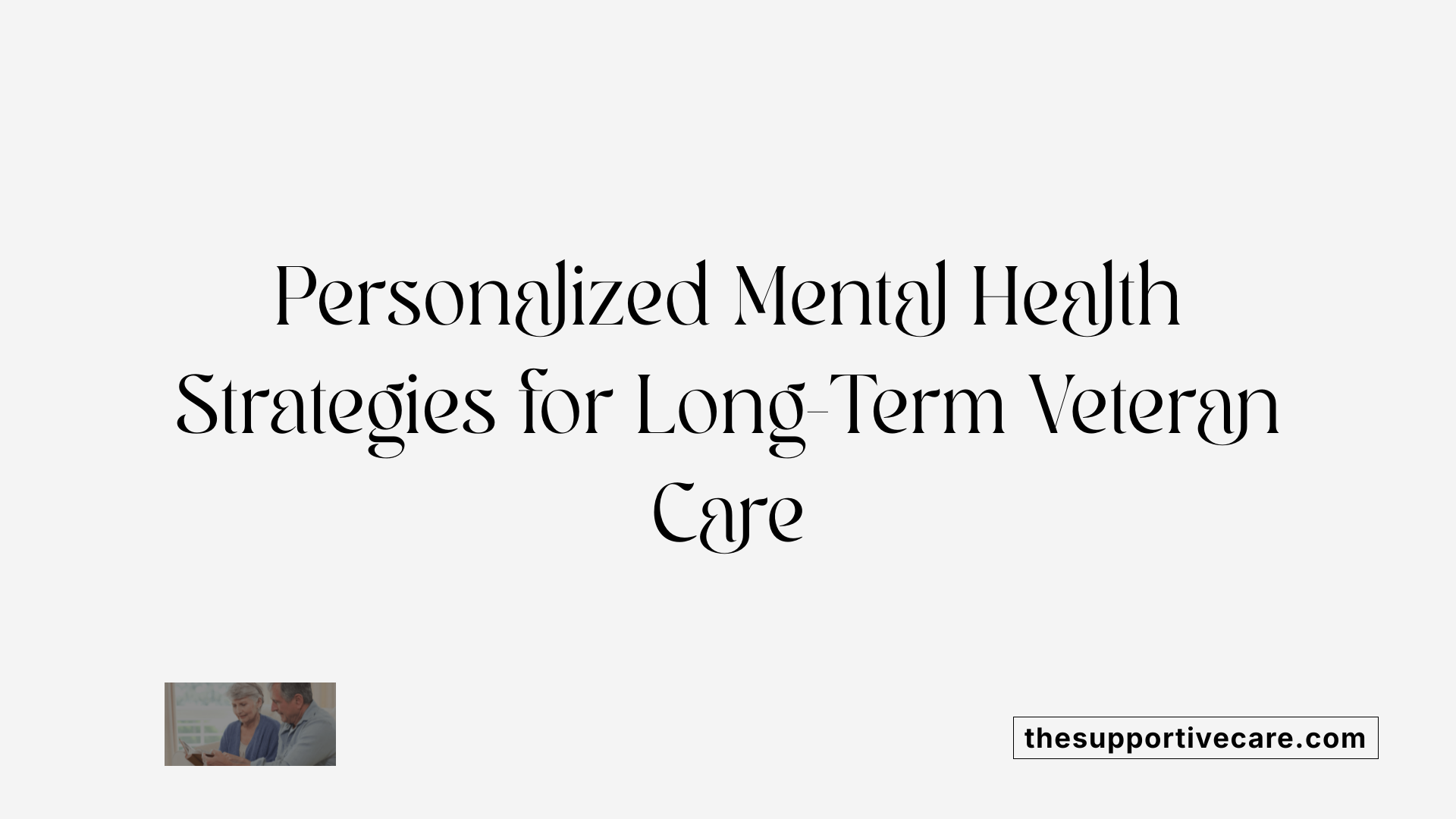
What strategies and initiatives are used to provide mental health care tailored to veterans in long-term care?
Providing effective mental health care to veterans in long-term settings requires a comprehensive, personalized approach. Strategies focus on integrating evidence-based therapies, fostering community and peer support, ensuring rapid access to crisis services, and ensuring care strategies respect veteran-centered principles.
One major initiative is the delivery of evidence-based therapies such as trauma-focused cognitive behavioral therapy (CBT) and other validated psychological treatments. These approaches help veterans process traumatic experiences, reduce symptoms of PTSD, depression, and anxiety, and build resilience.
In addition to therapy, the VA emphasizes whole-health and community engagement models. These strategies address not just psychological needs but also medical, social, and spiritual aspects. Programs like the VA's GeriPACT and other geriatric initiatives incorporate physical health, social connection, and mental health support tailored for aging veterans.
Crisis and emergency services are vital components of veteran mental health care. The Veterans Crisis Line operates 24/7, providing immediate support, assessment, and referral to local services. The expansion of the 988 Suicide and Crisis Lifeline has further improved access to crisis support. Community partnerships, including collaboration with nonprofit organizations and local health agencies, help extend crisis response capacity.
Veteran-centered care approaches prioritize individual needs, military cultural competence, and respect for veterans' preferences. Programs like the VA's Veteran-Directed Care Program empower veterans with choices over their care, including self-directing services in residential and community settings. This respects their autonomy and promotes engagement.
Moreover, the VA and affiliated organizations utilize measurement-based care, involving veterans actively in tracking progress and tailoring interventions over time. Community engagement efforts, including outreach through veteran service organizations and local clinics, ensure ongoing support and reduce stigma.
Access to non-VA community care through programs like the Veterans Choice and community referrals allows veterans to receive culturally competent treatment outside VA facilities when necessary. Telehealth services also play a vital role, especially for rural veterans or those with mobility issues, providing convenience and timely access to mental health providers.
Overall, these combined efforts—evidence-based therapies, community engagement, crisis support, and veteran-centered initiatives—aim to promote recovery, resilience, and long-term mental well-being for veterans in various care settings.
Common Mental Health Issues Among Veterans in Long-Term Care
What are the common mental health issues faced by veterans in long-term care, such as PTSD or traumatic brain injury?
Veterans in long-term care frequently contend with a range of mental health challenges, notably post-traumatic stress disorder (PTSD), depression, anxiety, and substance use disorders (SUDs). These issues often stem from the traumatic experiences encountered during military service, including combat exposure and military sexual trauma.
PTSD is a prevalent condition among veterans, affecting approximately 9-15% of those who served in recent conflicts like Iraq and Afghanistan. Symptoms include intrusive memories, nightmares, hyperarousal, and emotional numbing. Often, PTSD co-occurs with depression and chronic pain, creating complex treatment needs. Co-occurring conditions increase the intensity and duration of treatment required.
Depression is also widespread among veterans, with studies indicating that around 21% of the general population will experience it at some point, and rates among veterans are even higher. Symptoms encompass persistent sadness, withdrawal from social activities, feelings of hopelessness, and in some cases, thoughts of self-harm or suicide.
Substance use disorders, especially involving alcohol, are common among veterans dealing with mental health issues. SUDs notably heighten the risk of suicidal behaviors and complicate recovery efforts. Veterans may turn to substances as a coping mechanism for their mental health struggles.
Traumatic brain injury (TBI) is another significant concern. It often results from blast exposures and impacts cognitive, emotional, and physical functioning. Veterans with TBI may experience memory issues, mood swings, irritability, and difficulty concentrating, which further affect their mental well-being.
Addressing these prevalent issues requires access to specialized VA mental health services, including inpatient and outpatient programs tailored for veterans. Peer support programs, counseling, therapy, and medication management play a vital role.
The VA’s commitment to providing targeted, evidence-based care ensures that veterans receive comprehensive support for these mental health challenges. Collaboration among healthcare providers, family members, and peer groups is essential for improving outcomes and enhancing quality of life for veterans in long-term care.
| Mental Health Issue | Prevalence | Common Symptoms | Associated Risks |
|---|---|---|---|
| PTSD | 9-15% of veterans | Intrusive memories, hypervigilance, emotional numbness | Increased risk of suicidality, substance abuse |
| Depression | Up to 21% of veterans | Sadness, withdrawal, hopelessness | Higher suicide rates, comorbidity with PTSD |
| Anxiety | Common among veterans | Restlessness, excessive worry, sleep difficulties | Chronic stress, substance misuse |
| Substance Use Disorders | Common, especially alcohol | Craving, loss of control, risky behaviors | Suicide, health deterioration |
| Traumatic Brain Injury (TBI) | Varies, high in combat zones | Memory deficits, mood swings, irritability | Long-term cognitive impairment, depression |
This illustration highlights the importance of integrated care approaches that address multiple overlapping conditions to effectively support veterans' mental health in long-term care settings.
Roles of Agencies and Programs in Veteran Mental Health Support
What roles do various agencies and programs play in supporting veterans' mental health?
Supporting the mental health of veterans involves a coordinated effort among multiple agencies and organizations, each playing distinct but interconnected roles.
The Department of Veterans Affairs (VA) is the primary provider of mental health services for eligible veterans. It offers a wide spectrum of care including outpatient and inpatient therapy, medication management, peer support, crisis intervention, and community outreach. VA programs like Vet Centers provide community-based support, peer counseling, and outreach to reduce stigma and facilitate access to care.
In addition to VA services, various non-profit and community organizations enrich this support network. The Wounded Warrior Project (WWP), for instance, offers workshops, mental health programs, and personalized support at no cost, focusing on PTSD, traumatic brain injury, and other conditions.
Give an Hour and other foundations provide free mental health services and promote mental health awareness, helping to bridge gaps where VA services may be inaccessible or insufficient.
Policy and legislative efforts also play a crucial role by shaping the scope and delivery of care. Legislation aims to expand program funding, improve provider reimbursement rates, and facilitate access to community-based and non-VA providers through initiatives like the Veterans Choice Program.
Specialized veteran mental health programs address specific needs, such as for women veterans, homeless veterans, or trauma-related conditions. The National Center for PTSD and similar research centers conduct vital studies to improve treatment efficacy and understand veteran-specific issues.
Research and evaluation centers like the VA Office of Research and Development and external partners analyze data on mental health trends, treatment outcomes, and barriers to care. Their findings guide improvements, policy decisions, and resource allocations.
Furthermore, programs such as SAMHSA (Substance Abuse and Mental Health Services Administration) work to expand culturally competent, stigma-free mental health services in the community. They focus on crisis intervention, mental health promotion, and substance use disorder treatment tailored for veterans.
Overall, this infrastructure of government agencies, non-profit organizations, community partners, and research institutions ensures a comprehensive, accessible, and veteran-centered approach to mental health care.
| Organization/Agency | Primary Focus | Support Functions | Additional Notes |
|---|---|---|---|
| Department of Veterans Affairs | Medical and psychological treatment for veterans | Counseling, medication management, crisis lines, community clinics | Largest provider; offers evidence-based care |
| Vet Centers | Community-based support for veterans | Peer counseling, outreach programs, stigma reduction | Serves post-deployment and combat veterans |
| Wounded Warrior Project | Non-profit mental health and advocacy | Workshops, mental health support, peer programs | Free services; broad outreach |
| Give an Hour | Free mental health services for military-connected | Counseling, education, outreach | Focuses on reducing stigma |
| SAMHSA | Community mental health and substance use services | Crisis intervention, prevention programs, cultural competency | Federal grant programs for local agencies |
| Research Centers | Advancing knowledge and treatment efficacy | Data collection, clinical trials, policy recommendations | Includes VA and academic institutions |
This shared effort emphasizes a holistic and accessible approach to veteran mental health, ensuring those who served receive the compassionate, tailored support they deserve.
Policies and Evidence-Based Programs for Service Improvement
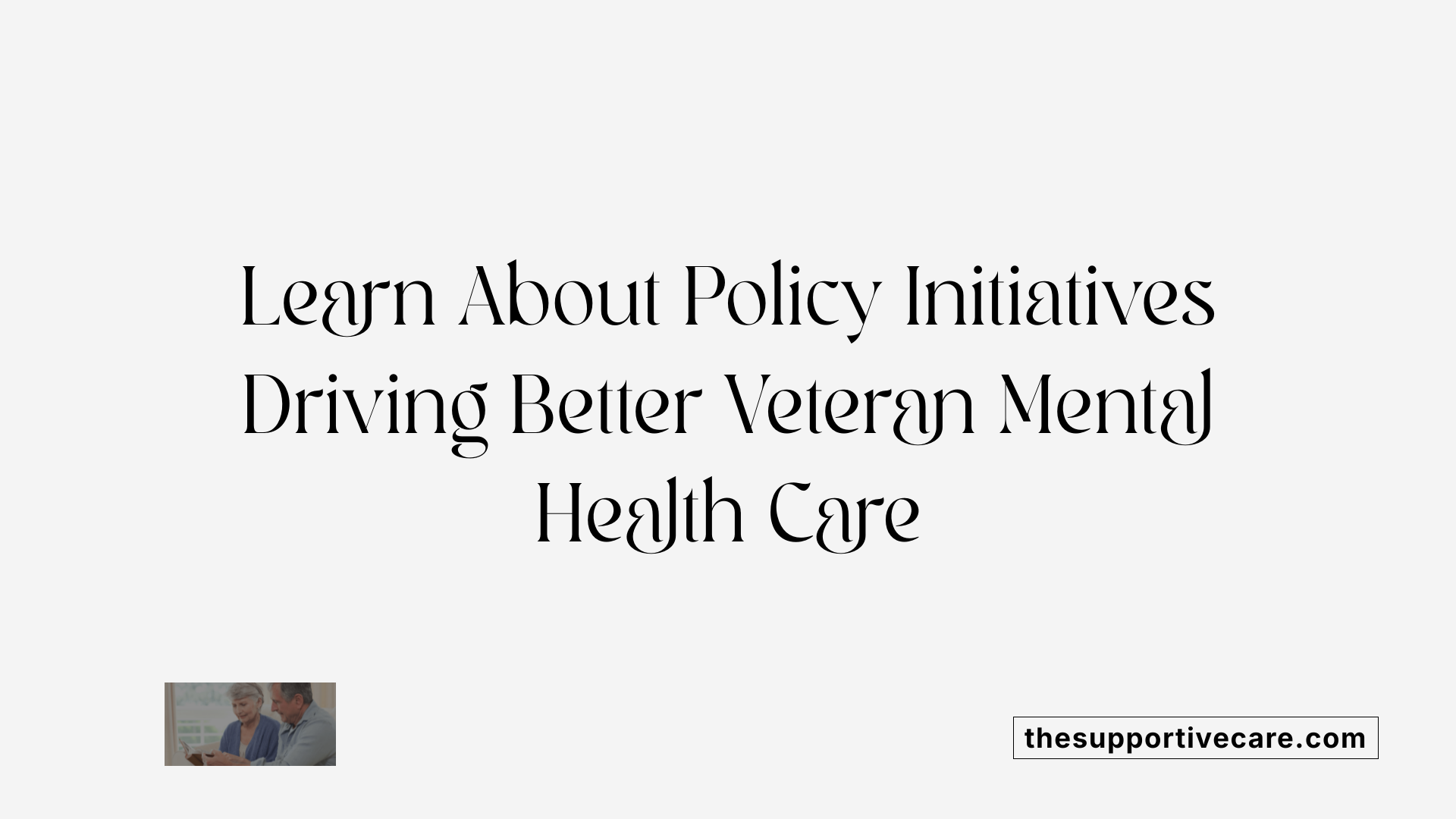
What organizational and policy strategies are being implemented to improve mental health support for veterans?
To enhance mental health care for veterans, several organizational and policy strategies have been introduced. Legislation plays a pivotal role in these efforts. Policies such as the STRONG Veterans Act, the COMPACT Act, and the Hannon Act are targeted at expanding access to mental health services, emphasizing preventive care, and ensuring sustained treatment opportunities. These laws aim to remove barriers that veterans face in receiving timely and effective care.
The VA system prioritizes the delivery of culturally competent, evidence-based therapies. Integrating mental health treatments within primary care settings fosters early intervention and reduces stigma. Programs like Suicide Prevention 2.0 and the PREVENTS initiative are specifically designed to address veteran suicides, implementing targeted outreach and risk reduction strategies.
Efforts to improve access include expanding community-based services through programs like the Veterans Choice Program, which allows veterans to seek care outside VA facilities when necessary. Removing discharge restrictions also facilitates access for more veterans, especially those who might otherwise be excluded from VA benefits.
Supporting these initiatives are efforts to reduce stigma through education campaigns, outreach activities, and shifts in military culture that promote mental health awareness. Moreover, increasing funding for mental health research and workforce capacity aims to address provider shortages and improve the quality of care.
Advocacy organizations, such as the Wounded Warrior Project, work alongside policymakers to ensure legislative protections and enhanced benefits, advocating for a comprehensive, barrier-free support system. These combined strategies aim to create a robust framework that continuously improves mental health services and outcomes for veterans.
Effective Evidence-Based Programs for Veteran Mental Health
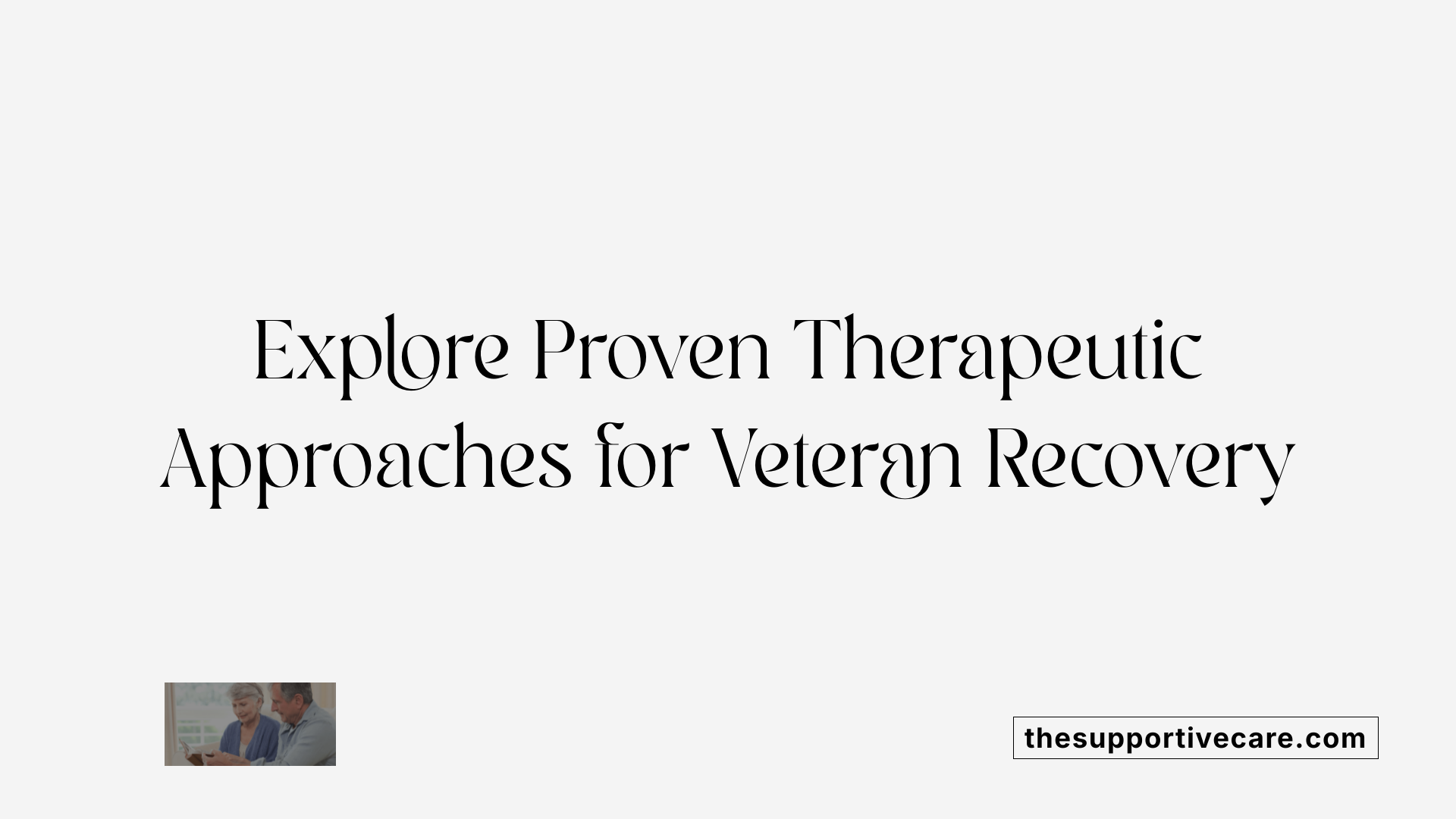
What evidence-based programs are effective for delivering mental health care to veterans?
Veterans facing mental health challenges such as PTSD, depression, and trauma-related disorders benefit from a range of proven, evidence-based programs. These therapies have been extensively researched and are implemented across VA facilities to ensure effective recovery and management.
One of the most commonly used treatments is Cognitive Behavioral Therapy (CBT), which helps veterans reframe negative thought patterns and develop coping skills. Complementing CBT, Prolonged Exposure Therapy (PET) and Cognitive Processing Therapy (CPT) are tailored specifically for trauma and PTSD, focusing on processing traumatic memories in a safe environment. Eye Movement Desensitization and Reprocessing (EMDR) is another impactful therapy shown to reduce PTSD symptoms by altering the way traumatic memories are stored in the brain.
The VA offers these therapies individually or in group settings, often supported by supplementary resources like worksheets, handouts, and digital tools. Veterans may engage with self-guided options such as VetChange, a program designed to aid alcohol and substance use issues, and various mental health apps that promote mindfulness, relaxation, and emotional regulation.
Beyond trauma-focused treatments, programs like behavioral activation and dialectical behavior therapy (DBT) are utilized to combat depression and emotional volatility. Problem-solving therapy helps veterans develop practical skills to manage daily challenges. These programs frequently incorporate safety planning and interpersonal therapy to bolster resilience.
Many of these therapies are integrated into comprehensive care plans that include medication management, peer support, and health promotion initiatives. Collaborative efforts between healthcare providers, veteran service organizations, and community resources are vital for expanding access and adapting these programs to meet diverse veteran needs.
Ultimately, the success of these programs is measured through improvements in symptom severity, functional outcomes, and quality of life, with ongoing research and program refinement ensuring their continued effectiveness.
| Therapy Type | Focus Area | Delivery Setting | Supporting Resources |
|---|---|---|---|
| Cognitive Behavioral Therapy (CBT) | PTSD, depression | Individual/group | Worksheets, apps |
| Prolonged Exposure Therapy (PET) | Trauma processing | Clinical sessions | Safety protocols |
| Cognitive Processing Therapy (CPT) | Trauma, guilt | VA clinics | Online modules |
| Eye Movement Desensitization (EMDR) | PTSD | Specialized therapists | Self-help tools |
| Behavioral Activation | Depression | Outpatient programs | Self-monitoring logs |
| Dialectical Behavior Therapy (DBT) | Emotional regulation | Group/individual | Skill development workbooks |
| Problem-solving therapy | Daily challenges | Community settings | Coach support |
These therapies highlight the VA’s commitment to deploying science-backed treatment modalities, ensuring veterans receive the most effective mental health support possible.
Research and Innovations in Veteran Mental Health Support
What research has been conducted on mental health support for veterans in long-term care?
Research focusing on veterans in long-term care settings has revealed that aging veterans often face higher incidences of mental health conditions like PTSD, depression, anxiety, and comorbid disorders. These studies aim to understand the unique challenges this population encounters and to improve care strategies.
One area of investigation has been the development of specialized clinical programs tailored to veterans with complex mental health needs. For instance, the VA's 'Care for Patients with Complex Problems' program and the 'Stress, Health, and Aging Research Program' focus on addressing trauma re-engagement, resilience-building, and managing multiple health issues simultaneously.
Innovative treatment approaches incorporate trauma-informed care, group therapy, and resilience training. Technology integration, especially telehealth services, has gained prominence in expanding access to mental health support, particularly for veterans living in rural or underserved areas. Telehealth has been effective in delivering therapy, medication management, and follow-up care remotely, reducing barriers related to transportation and mobility.
Research studies have also analyzed predictors and barriers to mental health care engagement among long-term care residents. Factors influencing treatment outcomes include the severity of symptoms, functional impairments, psychosocial status, and social support networks.
To improve access and efficiency, the VA has expanded residential treatment programs such as Mental Health Residential Rehabilitation and Treatment Programs (MH RRTPs), which provide intensive psychiatric care in structured environments. Evidence suggests that participation in these programs reduces mortality rates, decreases hospitalization, and promotes recovery and community reintegration.
The implementation of centralized screening and assessment protocols has effectively reduced wait times and improved early identification of mental health issues. These improvements facilitate timely intervention and continuity of care.
Overall, ongoing research underscores the importance of integrating interdisciplinary, accessible, and technology-supported models of care. Tailoring interventions to the mental health complexities of veterans in long-term settings enhances recovery, reduces hospitalization, and improves quality of life.
Visual Overview of Current Research and Practices
| Research Focus | Innovations/Interventions | Outcomes & Future Directions |
|---|---|---|
| Mental health needs assessment in aging veterans | Trauma-informed multidisciplinary programs | Reduced mortality & hospitalizations |
| Barriers to care engagement | Telehealth and remote monitoring | Improved access & early detection |
| Residential and structured treatment programs | Centralized screening & assessment | Enhanced recovery & community reintegration |
| Predictors of long-term care stays | Resilience and psychosocial support | Focus on personalized, accessible care models |
| Outcome studies on treatment efficacy | Technology-enabled care platforms | Emphasis on evidence-based, patient-centered practices |
By continuously refining these research insights, the VA and affiliated organizations aim to develop more effective, accessible, and comprehensive mental health services. This approach ensures that aging veterans receive the compassionate and high-quality care they deserve, addressing both their immediate needs and long-term well-being.
Future of Veteran Mental Health Support
Looking ahead, expanding use of digital health technology, personalized treatment plans, and community-based programs will likely shape future research and practice. Emphasizing early intervention, reducing stigma, and improving workforce capacity remain foundational to advancing veteran mental health, especially within the context of aging and complex care needs. Collaboration across federal agencies, academic institutions, and veteran organizations will be essential to sustain improvements, innovate solutions, and ultimately enhance mental health outcomes for our nation's veterans.
Moving Forward: Strengthening Support Systems for Veteran Well-Being
Supporting veterans in long-term care through comprehensive mental health services requires ongoing commitment across policy, clinical practice, community engagement, and research. The integration of evidence-based therapies, innovative care models, and community partnership can significantly improve mental health outcomes. Addressing barriers to access, expanding specialized programs, and fostering a stigma-free culture are essential steps toward ensuring every veteran receives the care, respect, and support they deserve. Future efforts must continue to adapt to the evolving needs of this population, prioritizing mental health as a cornerstone of holistic veteran care.
References
- VA Mental Health Services | Veterans Affairs
- Nursing homes, assisted living, and home health care
- Veteran Mental Health Services
- Tip Sheet: Engaging Veterans in Evidence-Based Programs
- Department of Veterans Affairs Mental Health Services ...
- Home and Community-Based Services: Veterans' Issues in ...
- Medicaid Cuts Threaten Veterans' Health Care
- The Veterans Health Administration's Mental Health Services
- Navigating Options for Veteran Home Health Care



































































































